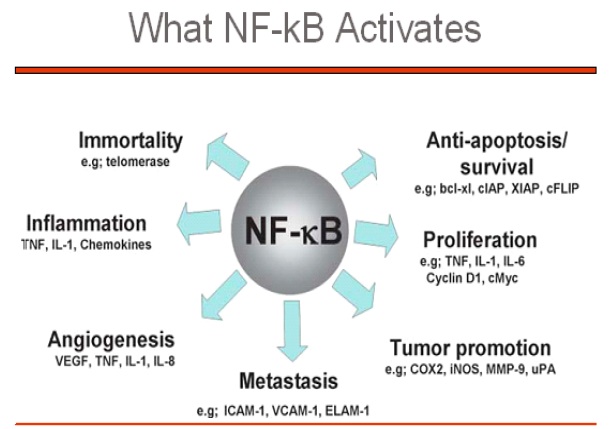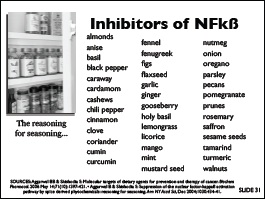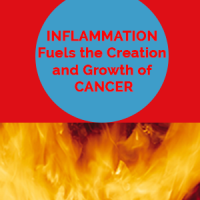What is inflammation? What is the relationship between inflammation and cancer?
Inflammation is commonly known as heat or fire in the body caused in response to tissue damage resulting from injury, infection, autoimmune response, exposure to toxins, and a range of other inflammatory offenders. In the process, inflammation may produce swelling, irritation, redness, and pain. The damaged area attracts immune cells producing inflammatory chemicals that work to kill toxins and stimulate regrowth of cells and blood vessels to mend the wound. That’s acute inflammation. Many inflammatory cases are acute inflammation with chemical production ceasing when the tissue is restored.
But sometimes the inflammatory response does not stop. The alarm reaction in the body continues in the presence of a perceived ongoing injury from inflammatory offenders. The continued inflammatory panic of a wound-repairing attempt gone wrong creates a hostile environment. Chronic inflammation in the body causes a chronic, confused immune response creating chaos instead of repair. The result is a terrain and overall environment in the body that supports cancer1-2.
“Interestingly, inflammation functions at all three stages of tumor development: initiation, progression and metastasis. Inflammation contributes to initiation by inducing the release of a variety of cytokines and chemokines that alert the vasculature to release inflammatory cells and factors into the tissue milieu, thereby causing oxidative damage, DNA mutations, and other changes in the microenvironment, making it more conducive to cell transformation, increased survival and proliferation. Chronic inflammation appears to contribute to tumor progression by establishing a milieu conducive to development of different cancers.”
-National Cancer Institute (NCI) Inflammation and Cancer Think Tank
Similar mechanisms appear to be associated with inflammation, immune response, and cancer such as decreased cell death (apoptosis), increased cell growth, and increased blood supply (angiogenesis). During acute inflammation, those processes allow injured tissue to repair. During chronic inflammation and cancer, those processes provide essential support to cancer cell growth.
Inflammation appears to both initiate and fuel cancer. The initiation is linked to a chronic state of inflammation and immune response. The fuel involves various ways cancer cells produce inflammation to sustain their growth. Ultimately, inflammation and cancer reciprocally feed one another.
“…the National Cancer Institute brought out a report highlighting inflammation research too often ignored by oncologists. The report describes in great detail the processes by which cancer cells manage to lead the body’s healing mechanisms astray. Just like immune cells gearing up to repair lesions, cancer cells need to produce inflammation to sustain their growth. To this end, they begin an abundant production of the same highly inflammatory substances—cytokines, prostaglandins, and leukotrienes—seen in the natural reparation of wounds. They act as chemical fertilizers promoting cell reproduction—in this case, cancer cell reproduction. Growing tumors use these substances to help themselves develop and to make the barriers surrounding them more permeable. The very process that enables the immune system to repair lesions and pursue enemies in all the body’s recesses is diverted for the benefit of cancer cells. They exploit it to spread and reproduce. Thanks to the inflammation they create, they infiltrate neighboring tissues, slip into the bloodstream, migrate, and establish remote colonies called metastases.”
–David Servan-Schreiber MD, Anticancer
What is the connection between inflammation and nuclear factor kappa beta (NF-kB)?
A major mechanism through which inflammation fuels cancer involves the production and activity of a protein called nuclear factor kappa beta (NF-kB). Cancer-promoting triggers of nuclear factor kappa beta include injury, other inflammatory offenders such as diet, acidity, carcinogens, bacteria, viruses, oxidation, stress, radiation, chemotherapy, environmental stimuli, and additional factors. Nuclear factor-kappa beta is considered a master switch in cancer accounting for approximately 95% of all cancers. Research indicates that nuclear factor kappa beta decreases cancer cell death (apoptosis) and increases cancer cell growth, blood supply to tumors (angiogenesis), invasion, and metastasis (1-5). Nuclear factor-kappa beta also fuels inflammation through COX-2 enzymes and cytokines such as interleukin-1 (IL-1), interleukin-6 (IL-6), and interleukin-8 (IL-8). Studies suggest that high levels of IL-6 are correlated with shorter survival in some people with cancer. Along with promoting cancer invasion, IL-6 stimulates vascular endothelial growth factor (VEGF) responsible for increased blood supply to tumors through angiogenesis2.

What is the relationship between inflammation and cancer survival? What are the potential benefits of low inflammation levels in the body?
Published research studies demonstrate inflammatory levels correlate with cancer.
Low inflammatory levels appear to indicate reduced cancer risk and improved cancer survival6.
High inflammatory levels appear to indicate increased cancer risk and poorer prognosis. Inflammation also decreases the quality of life, impairs immune functions, plays a central role in cancer cachexia7, and lowers toleration of some anticancer therapies8.
Research indicates that measuring inflammation may predict survival time for many cancers9. Some cancer studies suggest that people with the lowest levels of inflammation were twice as likely to live through the next several years10-12.
Low inflammation levels also support the prevention, control, and reversal of inflammatory conditions associated with other health problems.
What are inflammatory offenders?
- Smoking
- Alcohol
- Indoor and outdoor pollution
- Sleep deficit
- Extreme exercise
- Unhealthy dietary fats such as excess omega-6, saturated, and trans fats
- Unhealthy carbohydrates such as excess high-glycemic index foods
- Unhealthy cooking methods such as high-flame or high-heat methods, including charcoal grilling and deep frying
- Being overweight and especially with excess abdominal fat13
- Blood sugar imbalances
- High levels of stress
- Ongoing emotional toxicity
What are some natural anti inflammatory strategies?
Anti inflammatory strategies include specific foods and supplements, exercise, balance in body, mind, and spirit, and the elimination of environmental toxins.
What are more specific natural anti inflammatory products such as an anti inflammation diet, anti inflammatory herbs, and supplements?
To help strongly block nuclear factor-kappa beta (also called the NF-kB inhibitor) central to fueling inflammation and cancer, Jeanne Wallace, Ph.D., CNC, an expert about cancer fighting foods, references some of the following natural agents against nuclear factor-kappa beta3.14,15

Almonds, anise, basil, black pepper, caraway, cardamom, cashews, chili pepper, cinnamon, clove, coriander, cumin, curcumin, fennel, fenugreek, figs, flaxseed, garlic, ginger, gooseberry, holy basil, lemongrass, licorice, mango, mint, mustard seed, nutmeg, onion, oregano, parsley, pecans, pomegranate, prunes, rosemary, saffron, sesame seeds, tamarind, turmeric, walnuts
In Life Over Cancer, Keith Block, MD references the following anti inflammation diet and supplements. The optimal anti inflammatory supplements for each individual may depend on the specific inflammatory molecules present at high levels.
- Salicylate-rich foods
- Wintergreen, turmeric, tomatoes
- Flavonoid-rich vegetables and fruits
- Artichokes, broccoli, cucumbers, onions, parsley, spinach, sweet potatoes, tomatoes, zucchini
- Apples, apricots, blackberries, blueberries, cantaloupe, cherries, cranberries, prunes, raspberries, red grapes, strawberries, tart cherries
- Spices
- Basil, bay leaves, cayenne pepper, fresh ginger root, mint, mustard, nutmeg, oregano, rosemary, sage, thyme, turmeric, curry
- Supplements
- An optimal supplement plan is best customized by a qualified provider. Some recommendations may also vary. Some anti inflammation supplements can include the following: Omega-3 fish oil, bromelain, vitamin D, vitamin C, garlic extract, stinging nettle leaf extract, resveratrol, luteolin, quercetin, curcumin, ginger extract, grape seed extract, boswellia, flower pollen extract, vitamin K1 or K2, alpha-lipoic acid, and mixed tocopherols, among others.
What tests measure inflammation?
Studies suggest that C-reactive protein is an important prognostic marker for cancer survival16-21. These findings appear to be independent of race, tumor stage, and body mass index3. There is some consensus among integrative cancer care providers for high sensitivity C-reactive protein levels below 1.0 mg/L.
What is the history of anti-inflammatory agents?
Anti-inflammatory substances such as curcumin in turmeric have been used in some health care systems for several thousands of years. Research into the relationship between inflammation and disease began in the 1800s. German scientists observed a link between inflammation and cancer in the mid-1800s. An increasing amount of studies investigating the association between inflammation and cancer, as well as anti-inflammatory agents, have occurred over the last few decades.
For More Information
- Life Over Cancer by Keith Block, MD
- Anticancer by David Servan-Schreiber MD, PhD
- The Definitive Guide to Cancer, 3rd Edition: An Integrative Approach to Prevention, Treatment, and Healing by Lise Alschuler, ND and Karolyn A. Gazella
- Healing Spices: How to Use 50 Everyday and Exotic Spices to Boost Health and Beat Disease by Bharat B. Aggarwal, PhD






